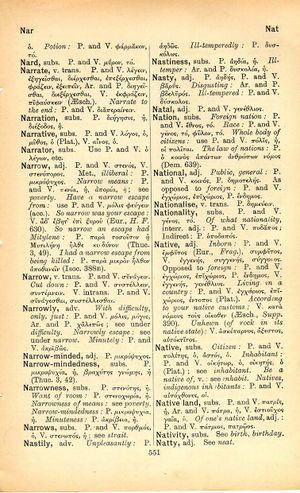native
Περὶ τοῦ ἐπέκεινα τοῦ νοῦ κατὰ μὲν νόησιν πολλὰ λέγεται, θεωρεῖται δὲ ἀνοησίᾳ κρείττονι νοήσεως → On the subject of that which is beyond intellect, many statements are made on the basis of intellection, but it may be immediately cognised only by means of a non-intellection superior to intellection
English > Greek (Woodhouse)
adj.
Inborn: P. and V. ἔμφυτος (Eur., Frag.), σύμφυτος, V. ἐγγενής, συγγενής, σύγγονος. Opposed to foreign: P. and V. ἐγχώριος, ἐπιχώριος, P. ἔνδημος, V. ἐγγενής, γενέθλιος. Living in a country: P. and V. ἐγχώριος, ἐπιχώριος, ἔντοπος (Plat.). According to your native customs: V. κατὰ νόμους τοὺς οἴκοθεν (Aesch., Supp. 390). Unhewn (of rock in its native state): V. ἀσκέπαρνος, ἄξεστος, αὐτόκτιτος. subs. Citizen: P. and V. πολίτης, ὁ, ἀστός, ὁ. Inhabitant: P. and V. οἰκήτωρ, ὁ, οἰκητής, ὁ (Plat.); see inhabitant. Be a native of v.: see inhabit. Natives, indigenous inhabitants: P. and V. αὐτόχθονες, οἱ.

